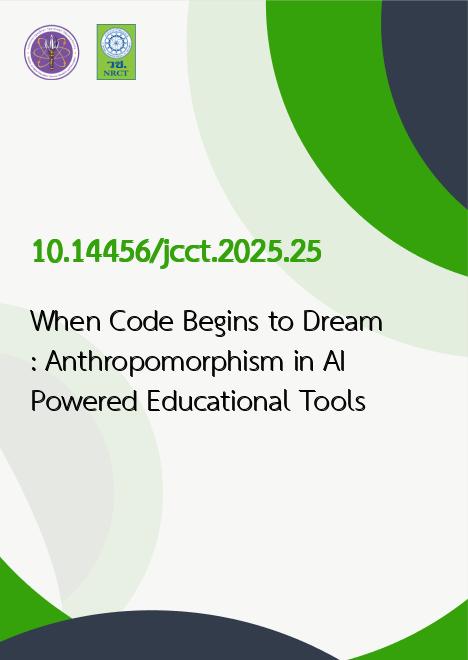
|
When Code Begins to Dream: Anthropomorphism in AI Powered Educational Tools |
|---|---|
| รหัสดีโอไอ | |
| Creator | Shristi Singh |
| Title | When Code Begins to Dream: Anthropomorphism in AI Powered Educational Tools |
| Publisher | Department of Computer Education, Faculty of Science and Technology, Surindra Rajabhat University |
| Publication Year | 2568 |
| Journal Title | Journal of Computer and Creative Technology |
| Journal Vol. | 3 |
| Journal No. | 2 |
| Page no. | 333-345 |
| Keyword | Anthropomorphism, Artificial Intelligence, Educational Tools, Ethics, Students |
| URL Website | https://so13.tci-thaijo.org/index.php/jcct |
| Website title | Journal of Computer and Creative Technology |
| ISSN | ISSN 2985-1580 (Print);ISSN 2985-1599 (Online) |
| Abstract | Anthropomorphism, the attribution of human traits to non-human creatures, has become popular in artificial intelligence-powered educational technologies to improve user interaction and learner engagement. This study examines the importance of anthropomorphism in AI-driven educational aids, analysing its psychological foundations, use in large language models (LLMs), and effects on student learning outcomes. This paper employs a conceptual analysis of current AI products (e.g., ChatGPT, DuoLingo Max) and utilises theoretical frameworks such as Social Presence Theory and the Uncanny Valley hypothesis to investigate the impact of human-like design elements—voice, emotion, and behaviour—on learner motivation, trust, and comprehension. The discourse encompasses advantages, such as enhanced engagement and tailored feedback, as well as concerns, including emotional manipulation, misrepresentation of AI capabilities, and diminished critical thinking. The study concludes that although anthropomorphism can greatly improve educational experiences, its implementation must be meticulously adjusted to prevent ethical dilemmas and reliance. |
